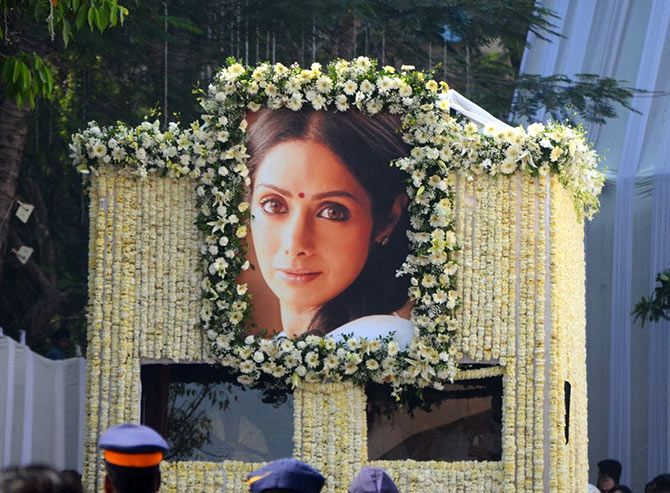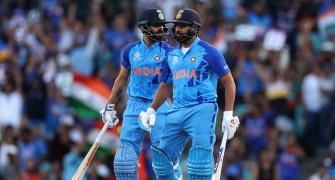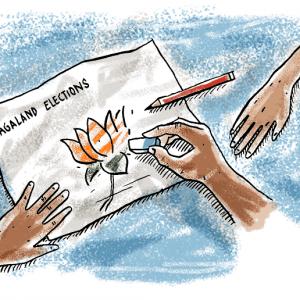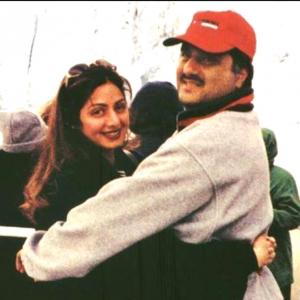Television channels were ready to plumb below rock bottom in their frenzied prospecting for TRP gold, says Shuma Raha.

IMAGE: Sridevi's cortege makes its way through Mumbai's streets. Photograph: Pradeep Bandekar
Reams have been written on the conduct of the India electronic media in the wake of the sudden death of actress Sridevi in a Dubai hotel.
Commentators have shredded the hyper-sensationalist way in which television channels covered the news.
On social media, too, the deplorable journalism and click-bait hashtags such as #SrideviDeathMystery were slammed with counter hashtags like #NewsKiMaut (death of news).
This, despite the fact that social media itself frothed with wild theories and wilder innuendoes regarding the circumstances of the beloved star's death.
Indeed, it seemed that TV channels were ready to plumb below rock bottom in their frenzied prospecting for TRP gold.
When the first reports suggested that the 54-year-old actress had died of a heart attack, there were grave discussions on whether such a calamity could occur if a person consumed appetite depressants and went under the knife multiple times in the pursuit of eternal youth.
The implication was clear: It was Sridevi's alleged lifestyle choices, her continuing to look lovely and lissom despite her age, that were responsible for her untimely death.
In other words, the same old misogynist chestnut was being tossed around once again -- that if a woman came to grief it was likely her own fault.
But once the Dubai police announced that Sridevi had accidentally drowned in her hotel room bathtub and that the post-mortem had found traces of alcohol in her blood, TV channels upped their game and erupted in an orgy of conspiracy theories and sickening theatrics.
One national channel claimed it was reconstructing 'Sridevi's last 15 minutes in the bathroom' (with no evidence to suggest that it had any hard information about the said 15 minutes), another had an anchor stand beside a bathtub with wine glass in hand.
A regional channel went a step further. It showed a digitally generated image of the actress lying prone in a bathtub with her husband Boney Kapoor looking down.
Mystery was created, foul play was hinted at.
Fantasy ruled and facts were thrown to the forewinds.
In essence, a piece of tragic news was clumsily and cynically spun into a salacious episode of mass entertainment.
You can't go much lower than this when it comes to journalism. But should any of this have surprised us?
First of all, it is naive to expect that the electronic media will not take advantage of their immediacy, their effortless access into our living rooms, to milk a celebrity death story.
Yes, other news was crowded out in the mystery-mongering over Sridevi's death. The Rs 120 billion Punjab National Bank scam lay forgotten, the horrific news about nine kids being mowed down by a Bharatiya Janata Party leader's SUV in Bihar was pushed to the background.
Instead, TV channels hotly debated bathtub dimensions and whether the deceased actress drank, and if so, what and how much.
However, the sorry fact is that much of modern journalism dwells not on matters of public interest but on what the public is interested in. And the two are not always synonymous.
The death of a star as huge as Sridevi is a big news event that can, at least for a few hours, legitimately put other news in the shade. But the fact that most television channels speculated about its likely cause for two days is as much a testament to their ignoble journalistic standards as it is to the enormous public appetite for juicy details about the rich and famous.
A celebrity death, spiced up by the suggestion of crime and sinful living, will make a lot of us lick our chops and hang in there for the next bit of speculation. And news channels know that.
This is not the first time that TV channels have erred on the side of sensation.
Remember the Sheena Bora murder? Or the death of Sunanda Pushkar, wife of Congress leader Shashi Tharoor? Or even the Aarushi Talwar murder?
In each case, the media played shamelessly to morbid public interest -- muddying facts and journalistic ethics in the process.
Last year one newly launched English channel went to the extent of implying, without any evidence whatsoever, that Mr Tharoor was complicit in his wife's death.
The point is that we live in a voyeuristic culture and the media -- not just in India, but the world over -- are but a product of that.
The US media's coverage of the O J Simpson murder trial in 1994-95 was famously relentless and often fantastically speculative. Not without reason.
Ted Koppel, then anchor of ABC's Nightline, who later apologised for devoting so much airtime to the O J story, once admitted, '...every time we did O J, the ratings went up 10 per cent.'
Back in India, some channels sought to take the moral high ground in their coverage of Sridevi's death, patting themselves on the back for not stooping to unholy speculation to drive up the ratings. Their admirable resolve may have earned them brownie points in some quarters.
However, as long as sensation sells, most TV channels will pursue it, or even manufacture it. And no amount of handwringing will stall the slide down that slippery slope.











